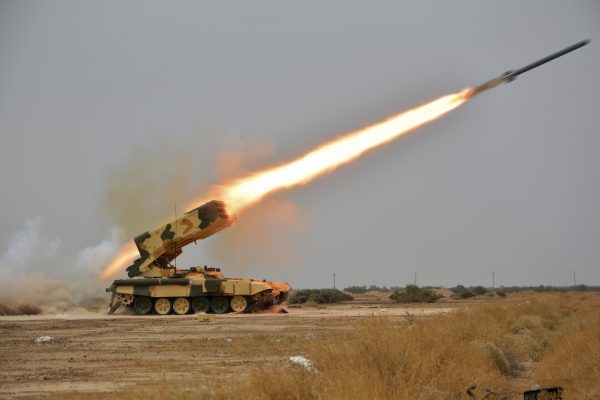Russia’s arms industry has long depended on exports to Asia. Moscow’s two biggest arms customers are India and China. More than 61 per cent of Russian arms sales between 2017 and 2021 went to Asia and Oceania. China has in recent years acquired turbofans from Russia for its indigenous fighter jets, while also buying S-400 air defence systems, helicopters and naval guns from Moscow.
While India has sought to diversify its arms procurement — partly informed by concerns about the quality of Russian arms imports — it remains a major customer for Russian arms. India has in recent years procured MiG-29 and Su-30 fighter aircraft, T-90 tanks, warships and anti-ship missile systems from Russia. Southeast Asia is another profitable market for Russian arms producers, with the export of the Su-27 and Su-30 fighter aircraft to Indonesia, Malaysia and Vietnam. Moscow has also sold air-to-air missiles, anti-ship missiles and helicopters throughout the region.
The war in Ukraine has led to the significant loss of Russian arms — including combat aircraft, helicopters, air defence systems and tanks. Moscow will need to devote significant production capacity to replenish its arsenal, reducing its capacity to produce arms for export. The level of support Russia provides for arms exports while engaged in Ukraine will indicate how determined it is to export arms to the lucrative East Asian market.
Russia’s arms production dilemma is exacerbated by sanctions targeting its defence sector. Although the Russian defence industry is far more autarkic than its Western counterparts, Russian arms production draws on inputs, such as microelectronics and semiconductors, from offshore suppliers. Arms production capacity will be reduced if the sanctions imposed by key suppliers, such as the United States and Taiwan, affect the supply of critical inputs.
Russia’s arms export capacity will depend on the effectiveness of Western sanctions. Russia is less vulnerable to sanctions because of measures to replace foreign defence suppliers implemented in response to Western sanctions imposed following its seizure of Crimea in 2014. But Russia’s scope for countering sanctions will be limited by their breadth and the limited pool of alternative suppliers from which to acquire key inputs needed to sustain defence manufacturing.
Russia has reportedly sought the assistance of China and other states in busting the latest round of sanctions, but the US government has signalled its intention to impose secondary sanctions — penalties levied against third-party states that choose to trade with a sanctioned entity — on states that assist Russia in circumventing sanctions.
Russian arms exports will also be affected by three demand-side issues — international censure due to moral outrage over civilian deaths and destruction in Ukraine, the disappointing performance of Russian military equipment and restricted access to the international financial banking system.
Countries are likely to be wary of purchasing Russian arms given the international opprobrium that Moscow has earned in the Russia–Ukraine conflict. This will be reinforced by the increased likelihood of the United States enforcing the 2017 Countering America’s Adversaries Through Sanctions Act (CAATSA) — a US law that sanctions states that procure weapons or defence technology from Russia — in an effort to discourage states from purchasing Russian arms. Yet the US government exercises discretion in its application of CAATSA, so whether or not to Washington sanctions entities that do business with Russia is likely to be decided on a case-by-case basis.
Russia’s lacklustre military performance in Ukraine will have an adverse reputational impact on Russian arms exports. The apparent failure of Russian arms to deliver military success is likely to discourage purchases by new and existing customers.
Sanctions will also impact the demand for Russian arms exports. Restricted access to the SWIFT international payments facility makes it more difficult to arrange payment for Russian arms. The need to resort to less efficient and more costly payment mechanisms, including the Chinese-led Cross-Border Interbank Payment System, will decrease the attractiveness of Russian arms.
Russia’s diminished arms export capacity is an opportunity for competing suppliers to supplant it as the arms supplier of choice to Asian states. Competitors, such as China and the United States, could exploit the vacuum created by Russia’s absence and the strong regional demand for combat aircraft could be met by European aerospace firms.
India is the most likely out of Russia’s existing customers to remain a reliable consumer of Russian arms. Moscow’s particular attributes as an arms supplier, including its complementarity to the United States and no strings attached approach to arms sales, mean it is likely to remain an important long term supplier of arms to Asian states.
That is good news for the Russian defence industry, because the loss of arms sales to Asia would deprive defence producers of funds that have helped compensate for the underfunding of defence R&D by the Russian government — a fact that predates the Russia–Ukraine conflict.
Richard A Bitzinger is a Visiting Senior Fellow at the S Rajaratnam School of International Studies (RSIS), Nanyang Technological University (NTU), Singapore.
Kenneth Boutin is an independent researcher focussing on the political economy of security.
A version of this article was first published here by the Institute of Defence and Strategic Studies at the S Rajaratnam School of International Studies, NTU.

